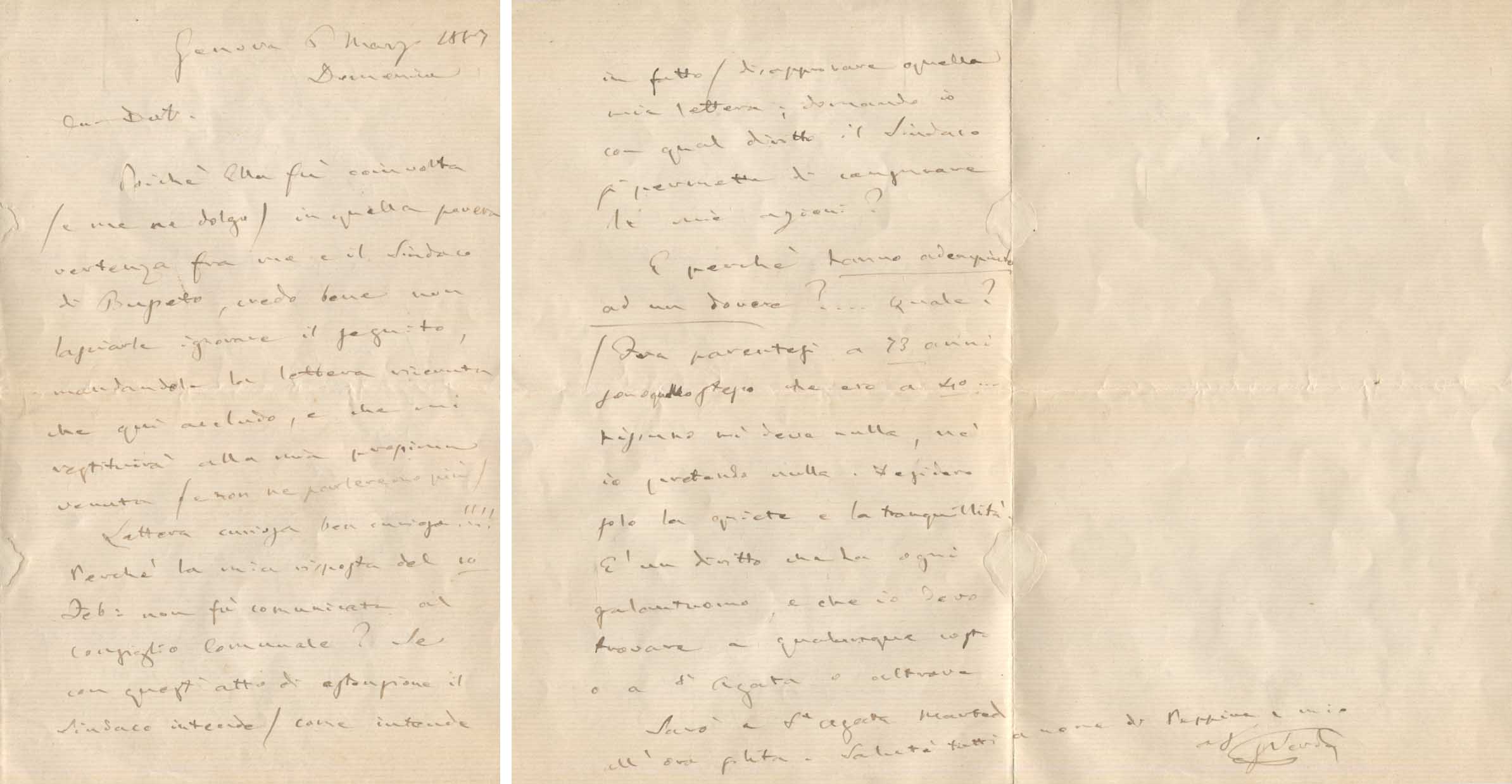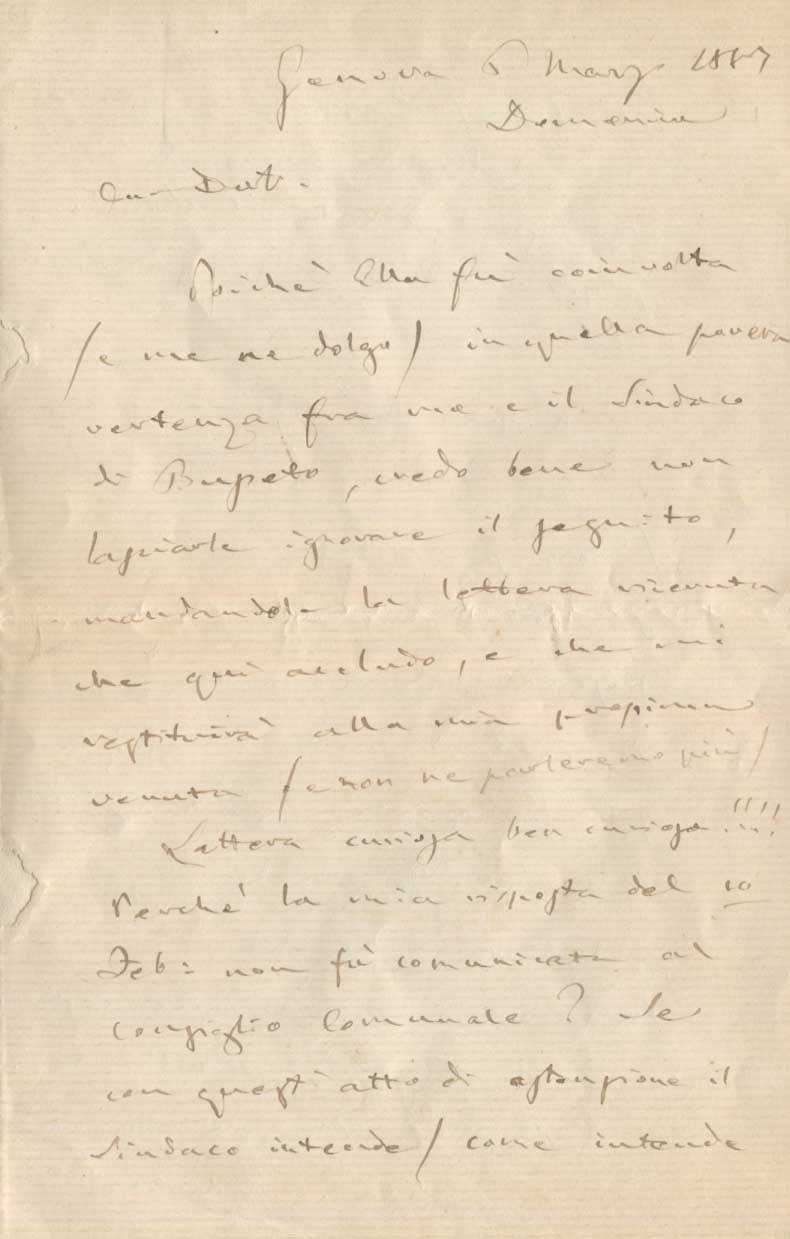Description
Autograph letter signed, 2 1/4 pages (on two conjoined sheets), 5,25 x 8,25 inch, Genoa, 6.03.1887, in Italian, to a dear doctor - curious letter alluding to a new dispute with the municipality of Busseto*, written and signed in dark ink "G. Verdi", with a horizontal letter fold, and mild signs of wear - in fine to very fine condition.
"Perchè ella fui coinvolta (è una me dolgo) in quella povera vertenza fra me e il sindaco di Busseto, credo bene non lasciarte ignorare il seguento, mandandola la lettere ricevuta che qui accludo, è che mi restituirà alla mia propizia venuta (e non ne parleremo più). Lettera curiosa ben curiosa !!!! Perché la mia risposta del 10 Feb. non fà comunicata al consieglio comunale? Se con quest’ atto di astansione il sindaco intende (come intende in fatta) disapprovare aquella mia lettera; demando io con quale diritto il sindaco si permette di canzonare là mia azioni ? E perché hanno adempiuto a un dovere?... Quale? (Tra parentesì a 73 anni son eguale stesso che ero a 40...) Nessuno mi deve nulla, nà io pretendo nulla. Desidero solo la quieta e la tranqullità. E un diritto cha ha ogni galantuomo, e che io devo trovare a qualanque costo e a St Agata o altrova. Saro a St Agata martedi all’ ora solita. Salutà tutti a nome de Peppina e moi...
G. Verdi"
Translated:
"Because she was involved (it's a sad thing) in that poor dispute between me and the mayor of Busseto, I think it's good not to let you ignore the following, by sending her the letter received which I enclose here, [...] (and won't talk any more). Curious letter well curious !!!! Why is my answer of 10 Feb. not communicated to the municipal council? If with this act of abstention the mayor intends (as he intends in fact) to disapprove of my letter; I ask by what right does the mayor allow himself to make fun of my actions there? And why did they fulfill a duty?... Which one? (By the way, at 73 I am the same as I was at 40...) No one owes me anything, nor do I expect anything. I just want peace and quiet. It is a right which every honest man has, and which I must find at any cost, in St Agatha's or elsewhere. I'll be at St Agatha's on Tuesday at the usual time. Greetings all in the name of Peppina and me
G. Verdi"
* Verdi's native hamlet, Roncole, depends on the municipality of Busseto. The old affair of the attribution to Verdi of the post of organist and master of music had divided the municipal council and the inhabitants in 1833-1835. This letter testifies to a renewal of hostilities with the municipal council, for another old cause.
Plus d'informations sur la personne
Profession:
(1813-1901) Italian opera composer.
Year of Birth: 1813
Giuseppe Fortunino Francesco Verdi was born in the small Italian village of Roncole on October 10, 1813. His parents, Carlo and Luigia, owned a small farm, and his father was a local innkeeper. From a young age, Verdi showed an interest in music, and his parents soon enrolled him in the local church choir.
Verdi was a gifted student, and eventually he was sent to study under the renowned composer and music teacher Vincenzo Lavigna in Busseto. Under Lavigna, Verdi studied composition and other musical disciplines, and he soon began to compose his own works. Verdi was also exposed to Italian opera through Lavigna, which would eventually become his most famous form of composition.
In 1836, Verdi composed his first opera, Oberto, which was a moderate success. He soon followed up this success with his next opera, Un Giorno di Regno, which was performed at La Scala in Milan in 1840. Verdi's popularity as a composer began to grow, and he had a string of successes with operas such as Nabucco (1842), Ernani (1844), and Rigoletto (1851).
Verdi's greatest works, however, came later in his career. In 1871, he composed Aida, which has become one of the most popular operas of all time. He followed this up with the hugely successful Otello in 1887 and Falstaff in 1893. Verdi's operas are still performed frequently today, and they are widely regarded as some of the best examples of the Italian operatic tradition.
Verdi was also a prominent political figure in Italy, and he was an outspoken advocate of Italian unification. He was a member of the Italian parliament, and he had close ties to the Italian nationalist movement. Verdi also composed several pieces of music that were inspired by the struggles of the Italian people, including his Requiem Mass in Memory of Alessandro Manzoni.
Giuseppe Verdi died on January 27, 1901, but his legacy lives on in his operas and other works. He is widely regarded as one of the most influential composers of all time, and he is remembered for his contribution to the Italian operatic tradition. His works are still performed and appreciated to this day, and he will forever be remembered as a master of Italian opera.
Certificat d'authenticité
Toutes nos pièces sont vendues avec un certificat d'authenticité. Si une pièce se révèle être erronée ou si vous n'aimez pas un autographe, vous récupérerez votre argent toute une vie.
Paiement et sécurité
Vos informations de paiement sont gérées de manière sécurisée. Nous ne stockons ni ne pouvons récupérer votre numéro de carte bancaire.



